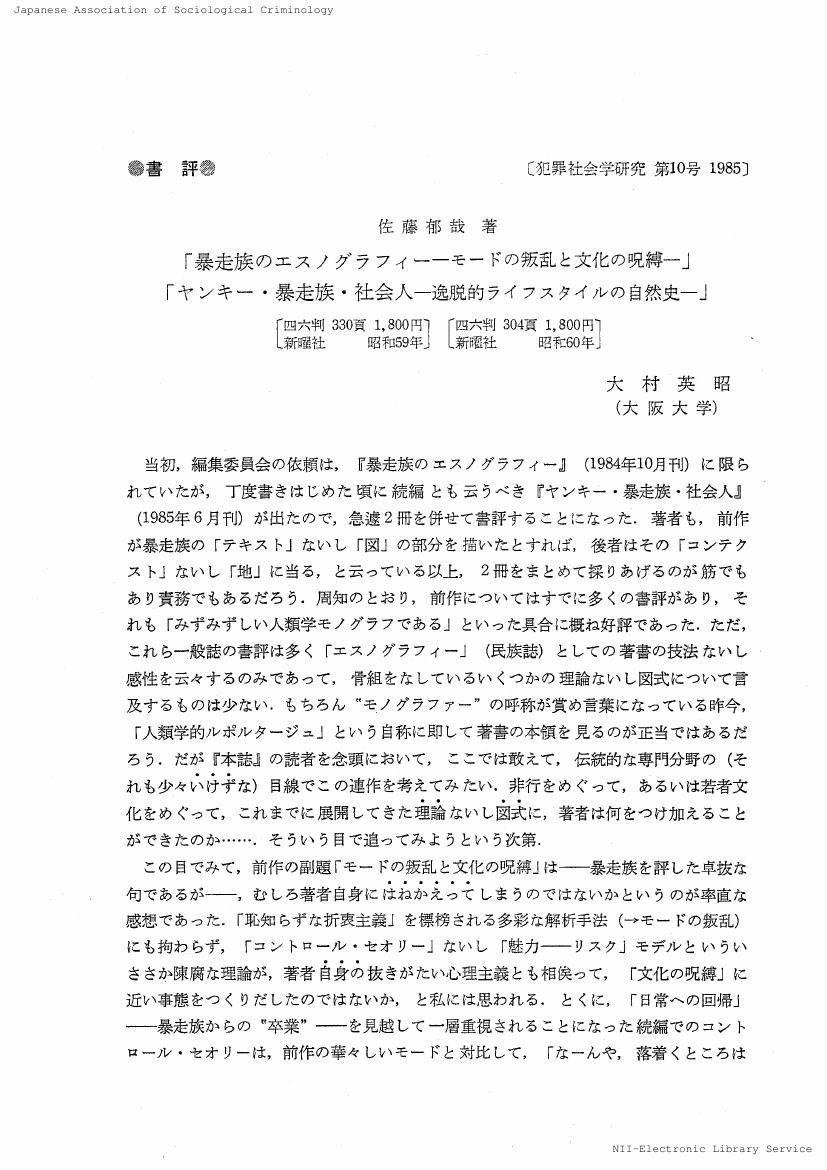- 著者
- 大村 英昭
- 出版者
- 日本犯罪社会学会
- 雑誌
- 犯罪社会学研究 (ISSN:0386460X)
- 巻号頁・発行日
- no.10, pp.187-190, 1985-09
- 著者
- 大村 英昭
- 出版者
- 日本犯罪社会学会
- 雑誌
- 犯罪社会学研究 (ISSN:0386460X)
- 巻号頁・発行日
- vol.9, pp.14-27, 1984
Many criminologists who have turned their attentions to the labeling perspective in the early 1970's, returned recently to the control (or bond) theory. Against the prevailing view, I believe, both of 'turn' and 'return' are symbolic phenomena of Durkheim Renaissance. If not, those switches in theory only mean that an existing paradigm has been persistently unable to solve "puzzles", or at least to explain a new type of crime. (Or would puzzles have been exhausted ?) Since no criminologist (as a scientist) can work in a theoretical vacuum, when a paradigm or a research program loses its ability to produce new 'facts', and I am afraid, it will often go into a "degenerative" phase. Therefore, the aim of this essay is to present a new perspective which is named as the dramaturgical theory of crime. Of course, I know this new theory is only a different rather than a better way of looking at reality. But in this essay I suggest the significance of this new theoretical orientation. For example, I propose that Goffman's Frame analysis could be effectively utilzed to make analytical sense of empirical facts. A schematic overview of my argument is illustrated in the following diagram. [figure]
4 0 0 0 OA 〈鼎談〉 幸福と社会学
- 著者
- 大村 英昭 塩原 勉 厚東 洋輔 山中 浩司 Eishou Ohmura Tsutomu Shiobara Yosuke Koto Hiroshi Yamanaka
- 雑誌
- 社会学部紀要 (ISSN:04529456)
- 巻号頁・発行日
- no.112, pp.29-35, 2011-03-15
- 著者
- 大村 英昭 Eisho Ohmura
- 出版者
- 関西学院大学大学院社会学研究科21世紀COEプログラム「人類の幸福に資する社会調査」の研究
- 雑誌
- 先端社会研究
- 巻号頁・発行日
- no.4, pp.160-202, 2006-09
- 著者
- 大村 英昭
- 出版者
- 日本犯罪社会学会
- 雑誌
- 犯罪社会学研究 (ISSN:0386460X)
- 巻号頁・発行日
- vol.10, pp.187-190, 1985 (Released:2017-03-30)

